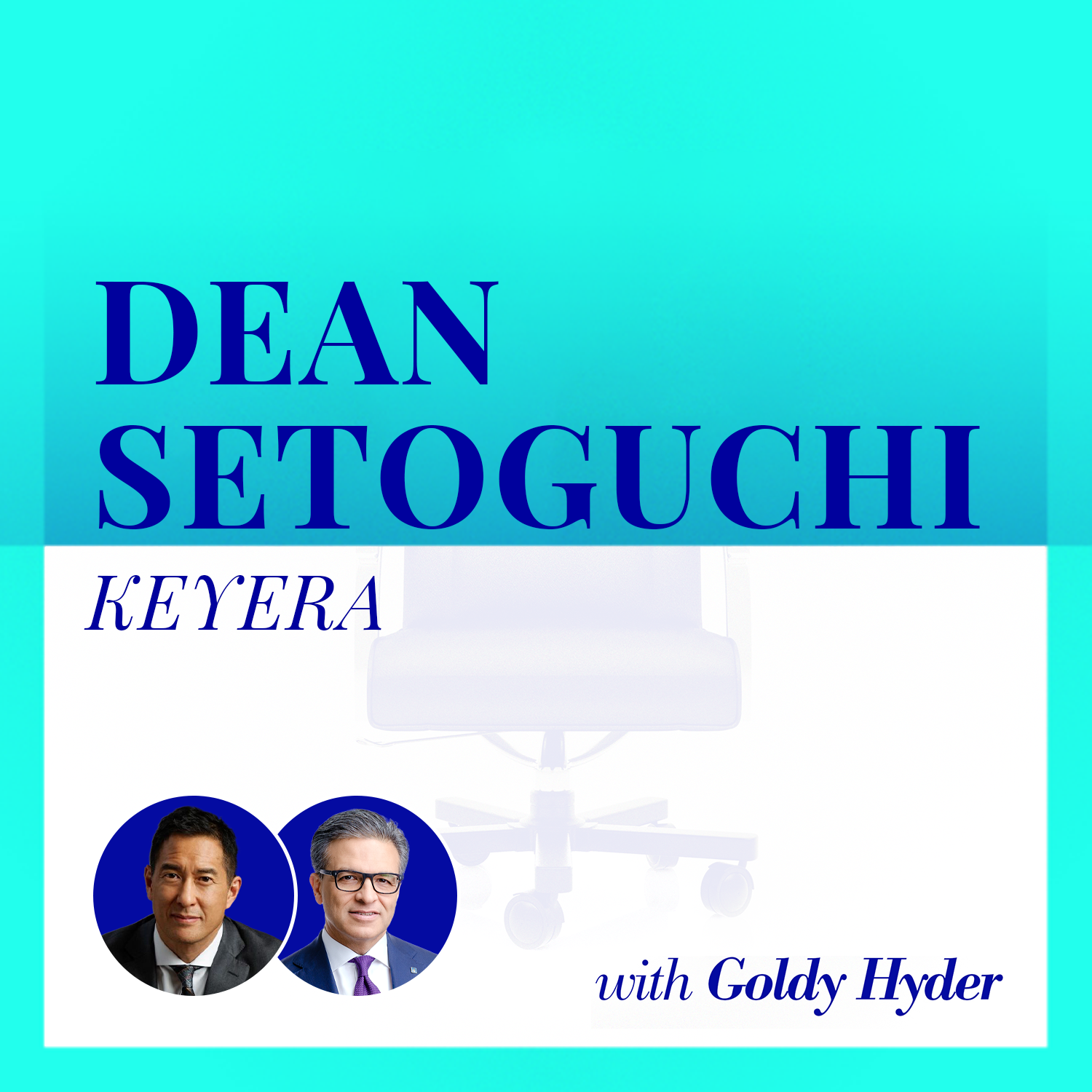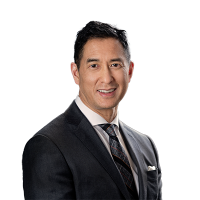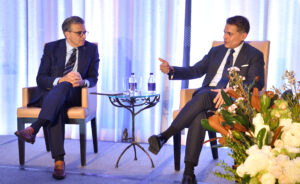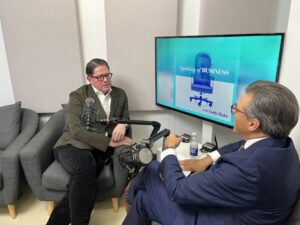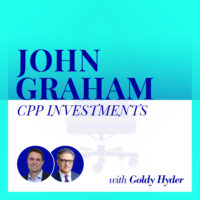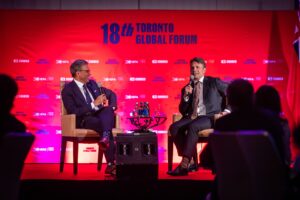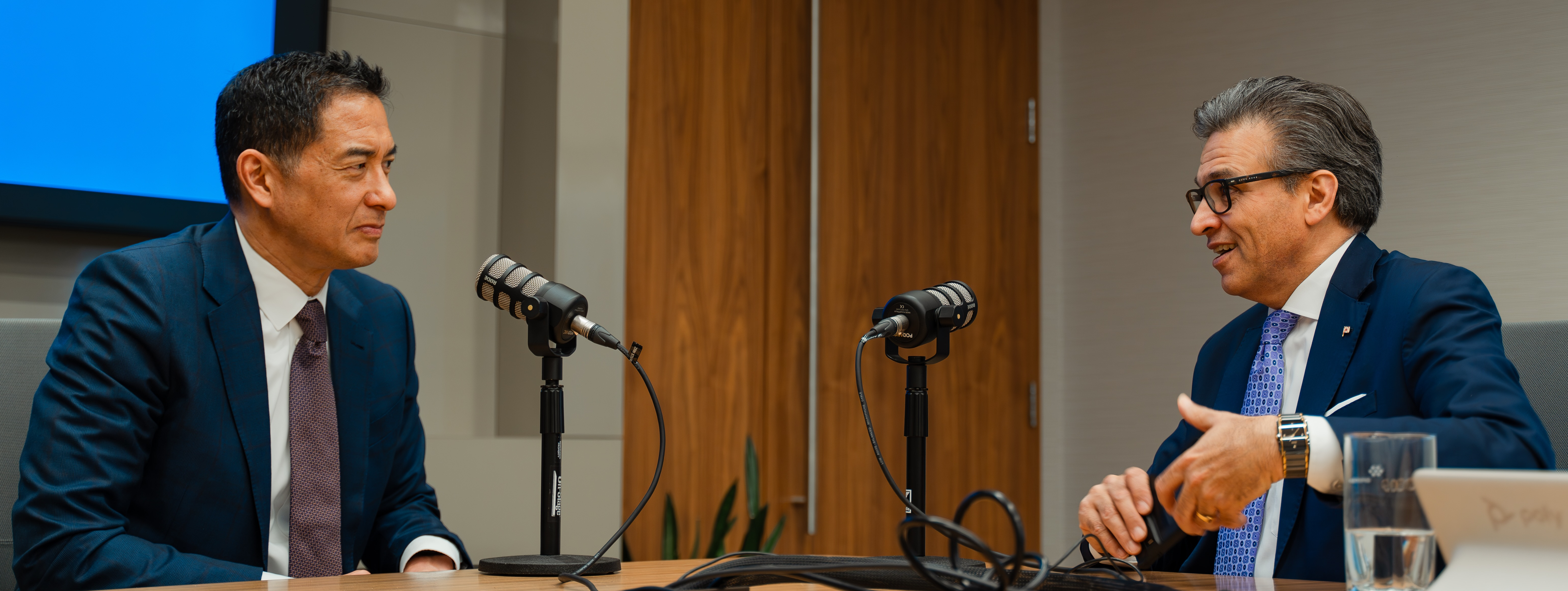
When Dean Setoguchi thinks about Canada’s energy industry, he sees a bright future, and it’s partly due to tariff threats from the United States. “I’m an optimist,” he tells Goldy Hyder on the Speaking of Business podcast. “I feel like there’s a recognition by Canadians that our national resources are our treasure, and I don’t think that recognition has been there for the past at least decade.”
The president and CEO of Keyera hopes momentum will build to get Canadian natural gas to more customers. “We have an opportunity to deliver the world’s most responsibly produced oil and natural gas in the world and we can help enrich people’s lives across the planet,” he says. “If we can get the right policy and regulatory framework, we can do great things.”
As a midstream infrastructure company, Keyera plays a vital role in processing and delivering natural gas across Canada and around the world.
Reflecting on his own career journey, Setoguchi shares how he transitioned from accounting to the oil and gas industry, embracing the entrepreneurial spirit and “enterprise-level thinking” that he learned while working with smaller companies.
He also discusses his deep ties to his hometown of Lethbridge, and the influence of his Japanese grandparents, who were interned during WWII. “I like that humble upbringing and being grounded no matter what position you are or what you do in life. At the end of the day, we’re all just people.”
Dean Setoguchi:
We are so blessed with natural resources. And so, we should feel lucky as Canadians that we have this wealth in our country and we should try to share that with our partners around the world.
Goldy Hyder:
Welcome to Speaking of Business, conversations with innovators, entrepreneurs, and leaders. I’m Goldy Hyder, president and CEO of the Business Council of Canada. I’m speaking to you from the headquarters of Keyera in Calgary. Now, the company may not be a household name to you, but I can assure you it has a big impact on households across Canada and frankly around the world.
That’s because Keyera plays an essential role in processing and delivering the natural gas that we all rely on. So, here, in the heart of Calgary, my hometown, you could say that Keyera sits at the center of Canada’s vital energy industry. Dean Setoguchi is Keyera’s President and CEO. Welcome to the podcast, Dean.
Dean Setoguchi:
Thank you very much for having me today. I’m very honoured, Goldy. And I also, before we get started, want to thank you for all the great leadership you provide to business in Canada and to all Canadians. So, again, thank you for leadership and keep up the great work.
Goldy Hyder:
Thank you for saying that we are indeed here for not just business, but for Canadians as you said. And I want to start talking about how Canadians are feeling right now. Maybe you as a Canadian can tell me how you’re feeling right now. We’re March 5th. It’s the day after the U.S. imposed shockingly sweeping blanket tariffs on pretty much everything, including energy. How are you feeling about things?
Dean Setoguchi:
I think about the big picture first and it’s disheartening to see what’s happening. Obviously, it’s causing a lot of turmoil in investment markets. But I think about the impact to all Canadians and this is going to cause a lot of inflation. It can create job loss, probably going to be a hit to our economy. But not only for Canadians’ economy, it’s going to hurt the United States and Mexico as well. So, I see it as a no-win for people, but I think about the people aspect first and foremost.
But I think the flip side is I’ve never seen more national unity in the past couple of decades than I see right now. And that’s really what Canada needs. Again, that’s been really exciting to see.
Goldy Hyder:
How do we make sure, because you’re right, I have not felt this kind of galvanized ambition for our country, a sense of unity, a sense of purpose, and frankly a sense of we’ve had enough. Like, “You don’t get to treat us this way.” Do you think we’re actually going to do the things that need to be done?
Dean Setoguchi:
I’m an optimist. I really feel like we’re going to build a lot of momentum from this. This is a great catalyst for Canada. The saying goes, “Don’t ever waste a good crisis.” And for me, in our industry, the energy, oil and gas industry, I feel like there’s a recognition by Canadians that our national resources are our treasure. And I don’t think that recognition has been there for the past at least decade.
We should be developing our resources to help our GDP, help our economy, create new jobs, and really support the revenues for our government so that they can deliver some great programs. So, I think there’s some great opportunities here. And the other thing, I think there’s a strong recognition that it’s risky to have only one major trade partner. So, hopefully that means a greater priority for Canada to prioritize more exports off of our coasts.
Goldy Hyder:
It’s been a tough decade for the industry in many ways. Been a lot of challenges. I mean, the things that you and I have talked about before and others is the regulatory pile-on and the overburdening, emissions cap and fuel regs and delays in permitting. There’s this uncertainty that existed and yet today we’re hearing everybody come together, talk about the need to move quicker. And if we’re going to do that, it’s going to have to come from Alberta. Do Albertans believe what they’re hearing and seeing about the possibilities of actually building the infrastructure that we’ve not been able to do for the last decade?
Dean Setoguchi:
I’m optimistic. Like I say, we have a very competitive industry. What we’ve always lacked is just the egress to get it to market. And under the right policy, we could grow substantially, because again, we have a very low marginal cost and we have an opportunity to deliver the world’s most responsibly produced oil and natural gas in the world and the planet, and we can help enrich people’s lives across the planet. I think that’s a fantastic vision. So, if we can get the right policy and regulatory framework, we can do great things. And like I say, we’re seeing some momentum on that front.
Goldy Hyder:
You and I were on a visit to Japan, what was it about a year ago or so I think it feels like. And you’re of Japanese heritage. You’re born here in Alberta, but your heritage is there. I want to talk first about that visit that we did there. How did it feel for you to go to where your origins are and how did you feel about the things you heard from them about Canada?
Dean Setoguchi:
Like you say, I was born in Canada and I’ve only been to Japan twice, including on that trip a couple of years ago. And it’s really good to reconnect with your heritage. And really one of the things I really noticed is we are so blessed with natural resources. They need to import everything. And so, we should feel lucky as Canadians that we have this wealth in our country and we should try to share that with our partners around the world.
So, I’m happy that we are trying to build those connections and greater trade relationships with our partners, including Japan, and it would be great for our industry and our economy in general.
Goldy Hyder:
Did you feel that we’ve let them down?
Dean Setoguchi:
Yeah. I mean the message from them is sell us more. Unfortunately, we are unable to do that right now. We just don’t have the right policy regulatory framework that enables us to move fast enough to address their needs. But certainly, there’s a huge demand for more LNG in particular, and that should be a great opportunity for Canada in the future.
Goldy Hyder:
Now, full disclosure, we both love this province. You know that. And I want our listeners to know that as well. What is it about Alberta that allows it to get the bad rap that it gets certainly here in our country? And are we at a place now where we can actually turn that around and do the things that Albertans are capable of doing?
Dean Setoguchi:
Well, I think our bad rap comes from, again, there’s been a lot of focus on sustainability. And believe me, as Albertans, we care a lot about sustainability. But the truth of the matter is that the demand for energy continues to grow and all sources of energy are going to be required to satisfy that demand, including oil and natural gas.
So, I think we get a bad rap because again, a lot of that is mainly produced in Alberta. I do want to emphasize that we have the best operating practices, the most responsible operating practices on the planet. And again, as Canadians, we should be proud of that, that we can supply that responsibly produced energy to the world.
Goldy Hyder:
Especially when you think about who else has it?
Dean Setoguchi:
Yes. Where else is it going to get developed? Think of all the places that develop those hydrocarbons. Canada’s the best place to get it from.
Goldy Hyder:
Well, let’s talk a little bit about your upbringing here. You’re from Lethbridge, many Canadians probably have not heard of Lethbridge. What was it like growing up in a … Well, it’s not a small town per se, but it’s a much smaller city in Alberta. What is it about Lethbridge that you feel helped gave you some foundational things that ended up serving in your life that led all the way to you being CEO of a company like Keyera?
Dean Setoguchi:
Well, there’s a big part of Lethbridge that’s in me that will always be a part of me. Lethbridge is two hours south of Calgary. The population now is about 100,000. Back when I was growing up was about 50,000. I grew up on the north end of town. If you’ve been to Lethbridge, you’d know that that is a more modest part of Lethbridge.
And maybe taking a step back, I mean, my grandparents, both of my grandparents on my mom and dad’s side, they immigrated from Japan into the coastal areas of BC. And during the war, they were interned and eventually they migrated to the farms, work on farms in the Taber area of Alberta. And then my parents moved off the farms and they got jobs. And a lot of the Japanese people lived together in the same house, like families, two or three families in one house. They couldn’t afford to have their own place. So, that’s what we did.
And my dad, what he did is he, on weekends and evenings, he built his own house on the north side of town and that’s where I grew up. And I think that cost them like $6,000 or $7,000 to build a house.
Goldy Hyder:
Hung onto that one.
Dean Setoguchi:
Just a little house. And a lot of my friends that I grew up with, they’re some of the greatest people on the planet. They are just really great people, great values, very grounded. So, I keep in good touch with them. My parents still live there. I love to visit them as well. So, I like that humble upbringing and being grounded no matter what position you are or what you do in life. At the end of the day, we’re all just people.
Goldy Hyder:
There’s a thing about this province, not only is it the work ethic, but it’s the attitude. It’s that sense of we’re going to get ‘er done, whatever it takes, whatever you need to do. And that can come from a place like Lethbridge.
Dean Setoguchi:
Yeah. I think in general, I think Albertans have great work ethic. But even above that, I think there’s a tremendous entrepreneurial spirit here. Like I said before, I think Alberta is one of the greatest places to do business in and also to live and raise a family as well. And I think that under the right framework, right policy, right regulations, we can do anything. We can attract capital here. We have great universities and technical schools to attract talent. We can do anything here. And we have a lot of successful businesses right here in Alberta.
Goldy Hyder:
Now, you’re an accountant by training and auditing, it turned out, really wasn’t your thing. How did you end up in the oil and gas industry?
Dean Setoguchi:
Yeah. Well, first of all, from Lethbridge, I always thought I’d grew up in live my whole life in Lethbridge. And my parents couldn’t offer me a lot in the way of career advice. But I wanted to do something, a profession of something. And I actually didn’t even know what engineer did. Didn’t want to go in the medical field. So, accountant was the only choice I had.
And I articled that Pricewaterhouse in Calgary and thinking I would just article, go back to Lethbridge and live my life. Once I got here, I thought, “Wow, there’s just so much opportunity in terms of business.” And back then, there’s probably 1,000 oil and gas companies. I mean, it was crazy. Everyone started one. So, as I was going through articling, I realized that was not my gig. I wasn’t passionate about it. So, I did my bare minimum two years of articling time. And I actually went to work for one of our clients. At the time, it was called Liquid Energy.
Goldy Hyder:
Were they a startup or …
Dean Setoguchi:
It was a series of partnerships out of Quebec, oil and gas partnerships. And interestingly enough, they amalgamated them all and listed it on the Toronto Stock Exchange and was one of the very first trusts ever in Canada. So, that was great. And then eventually, we’re sold to another trust, which was called Serenpet. But that just gave me just that ground roots opportunity to work with a smaller company, try to build it up and take it public, and then eventually find the right market conditions and go and sell it.
And then from there, we basically, a group of us out of Lakewood, we started up another company. I seeded a company at 26, 27 years old.
Goldy Hyder:
Did your parents have a clue you were doing all of this?
Dean Setoguchi:
They’re probably shaking their head. And it’s a really interesting process, because you learn … I mean, I wouldn’t recommend it to everyone. But I learned so much at that time because there’s four of us. We put a lot of the money that we received from the sale of this company back on the table. We seeded the company. Didn’t really know what we’re doing. We literally went to Office Depot and bought the kit for a desk and we’re in there building our own desks and everything was out of our own money and we had to build a business out of it.
Goldy Hyder:
Yeah.
Dean Setoguchi:
But we learned a lot and we built it up and sold that one, too.
Goldy Hyder:
Well, I’ve heard you talk about the notion of enterprise thinking. And it sounds like this is the foundation of it, the idea of just starting from the ground floor up.
Dean Setoguchi:
It’s amazing when it’s your business, when it’s your money, you’re thinking about how do you deploy capital in the most efficient manner? You treat every dollar like it’s your own, because it is truly your own dollar. And working in small companies, whatever role you have in the company, you’re really interdependent on other teams, other people.
And so, in a small company, you’re working with everybody and you know what the objectives are of the company. You know your critical success factors. So, you always have that in mind with everything you do, you develop that enterprise-level thinking, which is very valuable.
Goldy Hyder:
Can you teach enterprise thinking? Can you develop it or do you think you either have it or you don’t?
Dean Setoguchi:
I think it can be developed. I always encourage young people to try to learn more than what you do. Whatever you do, what does the next person do with that and what does the next person do with that after that? What are the objectives of the corporation and understand what you do and how that connects with delivering on the objectives of the corporation?
I think those are some of the things that people should be asking themselves and make sure they understand that very clearly. I also encourage people, and sometimes I have to pull teeth with some of our young talented people to take different jobs, learn something totally different. They’re always scared that they’re going to be pigeonholed there. They’re going to be there, left there for the rest of your career. I’m saying, “No. Go work there for two or three years. You’re going to develop some great skills and perspectives and then we’ll move you somewhere else. You’re going to be more valuable.”
Goldy Hyder:
I can’t agree with you more. I’ve experienced that myself. I think about my parents putting $28 in their pocket, moving across an ocean. And I can’t get a kid to move from Toronto to Ottawa, or from Calgary to Edmonton. “I don’t want to do that.” I agree with you on that. Now, when you were talking about your enterprise thinking, I want to talk a little bit about the fact that life’s not a straight line. This was risky, what you were doing. I’m sure there were ups and downs. How important is failure in the journey of a leader?
Dean Setoguchi:
Sometimes you can read all the books you want. And believe me, I like to listen to other people and their experiences, because if I can learn from other people’s experiences instead of learning it myself, that’s better. But obviously, not everything works all the time. And especially in our industry that is very cyclical, lots of boom and bust. But it really taught me also to be resilient, learned a lot about, it’s not just all about upside and making more profit, it’s also about protecting your downside and managing risk. So, lots of lessons learned on both sides of the coin there.
Goldy Hyder:
A lot of people, they turn on their lights, they turn on their appliances, they don’t even think about where the energy is coming from and where the power is coming. But the reliability of it is so key. So, we’re sitting here in downtown Calgary, which is really the heart of Canada’s energy sector. So, I want to help inform and educate our listeners on what Keyera itself does. Let’s start with Alberta oil and gas. It comes out of the ground and then somehow you get involved. Take us through that.
Dean Setoguchi:
Yeah. Well, first of all, we are a midstream infrastructure company. And what we do is we provide essential services with our infrastructure and services to make our basin more competitive, enable it to grow. So, what that means is that when a producer drills a well, a natural gas well, right from there, we take their natural gas and we process it.
And in order for that natural gas to be usable in your furnace or anything like that, you have to strip out the impurities out of it to meet the pipeline specification. So, we strip out, sometimes it has water in it or it might have H2S, which could be very deadly. So, we provide that service. But what we also provide is a value-add service where we extract the natural gas liquids and we extract ethane, propane, butane and condensate, and we have pipelines that transport it. We further process it into spec products.
We have big storage, underground storage caverns, and we have a lot of pipelines and terminals to get those products to market. So, ethane in particular just goes to the petrochemical industry and we deliver that to them. On the propane side, we have big rail terminals, truck terminals where we deliver it locally to industrial markets. We rail some to the United States, other parts of Canada, but also off the west coast to our friends in Japan and South Korea, which is certainly a growing market.
Butane, we have a facility in Edmonton where we upgrade the butane into a high-quality gasoline additive, so it’s called isooctane. And so, Goldy, if you have a Ferrari at home, I don’t. But if you have that fancy sports car …
Goldy Hyder:
Trust me, we don’t have a Ferrari at home.
Dean Setoguchi:
But we make a high-end product like that. So, we have a good end market for our butane. And condensate is used for diluent where oil sands producers can’t flow their bitumen through a pipeline, because it’s too viscous, so they need a light harder carbon, and we provide that service as well.
Goldy Hyder:
Now, it’s not just used for heating homes as we think about it, how else is natural gas being used that people just take for granted?
Dean Setoguchi:
Well, I mean a lot of it’s used for cooking. I mean, I don’t know, your barbecue at home or a lot of people have gas stoves and things like that. But certainly, the largest growth areas for natural gas in North America is just the growing demand for data centres. The power required for data centres. And you need a reliable power source.
So, if you want to power it through wind or solar, I mean those are intermittent sources of energy. Natural gas is very reliable. And especially the natural gas we produce here in Alberta, we actually have the ability to do carbon capture off it, too, to make low carbon power. So, we certainly see the demand for power and data centres to grow right across North America.
Goldy Hyder:
Now, there’s been a lot of attention given to the industry in terms of what is it doing to help on the climate change question. How seriously is the industry taking emissions reduction? What advances have been made in technology to be able to say that. You’re confident that we’re doing all that we can?
Dean Setoguchi:
I think from all aspects of sustainability and ESG, I’m really proud of what our industry has done. I can tell you personally, I live my life that way. I try to live a sustainable, reduce my environmental footprint. But at Keyera, we’ve done a lot of work. We set a goal out there to reduce our emissions intensity by 25% from 2019 to 2025 and looks like we’re going to hit that mark early. We have a lot of initiatives that created absolute emissions reductions across our facilities.
So, again, we have to be a profitable entity. We are a publicly traded company with shareholders. But we’ve been able to accomplish both. Again, reduce our footprint, but at the same time be a very profitable company. So, we’re very proud of that.
Goldy Hyder:
You mentioned shareholders. There’s always this perception that these are some mythical people that are all just there profiting shamelessly from your hard work. Who are the shareholders in your mind of these companies?
Dean Setoguchi:
That’s a great question, Goldy. And a lot of people would know that our origin as a public company was as a trust, and that was back in 2003. And most of our shareholder base back then, and a lot of them are still shareholders today, more than 20-plus years later, is that they’re a lot of retired people. They rely on the income from our dividend stream, and we’ve never cut our dividend through our entire history as a company, and we’ve only increased it.
So, a lot of people rely on our dividends to live their life and to deal with inflationary costs of living and things like that. So, the more profitable we are, the more we’re able to return to our shareholders. And again, I think of people like my parents and a lot of their friends who own our shares and benefit from it.
Goldy Hyder:
Canada has often come under criticism that we don’t celebrate success of our business community. We do it for the ice hockey and stuff like that, but we don’t celebrate. Do you think we’re at a moment here and now because of everything that we’re going on and this existential threat that just may be true partnerships between business and government and labour and Indigenous groups can be formed in a way in which we actually celebrate the role that each of us play in growing our economy?
Dean Setoguchi:
Yeah. I mean, I think sometimes that people have the wrong impression of corporations and we employ 1,200 people at Keyera. We also employ thousands of consultants, contractors that work for us. We have great partnerships in our communities with First Nations groups. We pay our share of taxes, which obviously helps government funding.
Goldy Hyder:
Well, your employees do, too. If they didn’t have a job, they wouldn’t be paying taxes.
Dean Setoguchi:
Absolutely. So, I think that obviously it’s a great partnership with government communities, our people, and yeah, we should celebrate that.
Goldy Hyder:
There’s a lot of attention being paid these days. Some of the workforce, if you will, are concerned about the advent and advancement of AI. How is AI affecting the energy sector? Do you think there are opportunities there or people legitimately worried about their own economic futures?
Dean Setoguchi:
No. I think that there are certainly opportunities with AI, but like anything you have to right size it for your particular company and certainly we’re looking at opportunities to apply it. And we are in some ways. I mean, we like to start small and not jump in with two feet. But I don’t think that it’s going to displace a whole bunch employees in any way. I think that we’re just going to use our employee base and resource base in different ways.
But we’re always trying to find ways to become more competitive and provide a more efficient service for our customers. So, AI can play a role in that.
Goldy Hyder:
What’s keeping you up at night these days?
Dean Setoguchi:
Well, I mean tariffs. But I believe that we have a tremendous opportunity as Canadians and our industry just because we’re blessed with just wealth of resources, natural resources, and we know how to extract them very profitably and responsibly. What we’ve had to contend with is just a layering on of just more and more incremental policies and regulations that are hard for a company to adjust to on a short period of time. As the infrastructure company, we build stuff, we have to deploy capital and we have to plan ahead.
Goldy Hyder:
In some cases, decades.
Dean Setoguchi:
That’s right. And so, when you’re making major, major investments and the policy regulatory environment is changing on a regular basis, that’s very unsettling. So, that’s what keeps me up at night.
Goldy Hyder:
Well, I figured the answer was going to be tariffs. And the reason I asked that of course is you’re not just in Canada. You have a footprint in operations in the United States as well. Are you feeling the pressure of, “Well, look, the operation should just be all in America. Now, why are you even in Canada?” Are you feeling that from the American side?
Dean Setoguchi:
Well, it’s interesting you say that. I mean, we established a footprint in the United States probably about seven or eight years ago. And part of it was is back then there was all the discussion about Trans Mountain hadn’t been sanctioned yet. Coastal GasLink hadn’t either. And there’s still talk about Keystone XL back then.
So, we thought if there’s not going to be any further growth in western Canada, we better set some seeds down in the U.S., because we’re going to have to deploy capital growth somewhere else. And now with the Coastal GasLink and Trans Mountain, we see growth in our basin. And so, we’d rather put our chips here in Canada. This is the best place to grow it.
If we get bottlenecked again and we don’t have the policy, permitting, regulatory framework to continue to grow, I guess we’ll have to consider other jurisdictions to deploy capital. But our preference is to do it right here in Canada.
Goldy Hyder:
Well, good to hear that. That’s for sure. I mean, you mentioned earlier part of the nature of business is to do good, that doing good frankly is good business. And you talked about not just the taxes that companies pay and their employees pay and the community services that you do. But I know everybody has some passion for some charity, has something that they really find important to them. You’re involved in a number of them, including the food bank. Why is this important to you personally?
Dean Setoguchi:
It’s a big concern of mine, just the disparity between the people that are just struggling to live a basic life. And in Alberta, we’ve had a disproportionate amount of people immigrate to Alberta. So, it’s put a lot of strain on everything. And that’s why unemployment rates are up higher, housing, lots of inflation and food. So, I love our community. I want to make sure that everybody can eat. And so, I’m very happy to give back and we have a very generous caring community here in Calgary. And I’m happy to be a part of it and to contribute to that.
Goldy Hyder:
What advice are you giving your kids these days?
Dean Setoguchi:
That’s a good one. It’s a tough world out there right now, unfortunately, and it’s a very expensive one. So, I try to give them some career direction.
Goldy Hyder:
Don’t be an accountant?
Dean Setoguchi:
Yeah. I do believe that work ethic matters a lot, and I do believe that relationships count a lot. So, one of the things, my daughter’s in the workforce now, and I tell her, “You know what? Go into work every day. You’re going to learn something a lot more than sitting at home and sitting on the screen. And I know that sounds very old school, but you’re going to build a lot better relationships. You’re going to get mentored more, and you’re going to get a lot more out of it.” And she agrees. So, she does that every day.
Goldy Hyder:
Well, look, you and I both share a great love for not just this province but our country. If you could give Canada any advice right now, what would it be?
Dean Setoguchi:
Well, it’s that we have a tremendous opportunity right now. I mean, unbelievable opportunity. We just have to get out of our own way. And so, as I said earlier, the tariffs give me some optimism, because I’m hearing now certainly a lot more urgency towards getting to our coast to do more trade with other partners other than the United States. It’s really exciting to me to see our premiers now working together to break down inter-provincial trade barriers, which is crazy.
Goldy Hyder:
It’s a tariff on Canadians by Canadians. I keep reminding everybody that.
Dean Setoguchi:
And so, if we can get to the policy regulatory framework, permitting, cut that down in time, we can do anything in this country. Absolutely anything. One time I met a gentleman from Saudi Arabia who had ran a petrochemical company there, and one thing he said to me, he says, “If the world went to crap,” I use different words. But he said, “Where else in the world would you want to live than Canada? Canada’s got everything.” And you made me think about, he said, “Yeah. You’re right.” So, if we just get out of our own way, we’ll do great things for our country and our people.
Goldy Hyder:
That’s a great spot to end, at least a serious part of the conversation because I want to have a little fun with you now as we wrap up and ask you some rapid fire questions. No right or wrong answers, although in some cases I might judge your answers. Favorite food?
Dean Setoguchi:
Favorite food? Well, I love food. I have a gluten dairy sensitivity, so that limits what I can eat sometimes. So, generally, anything that’s healthy, I’ll eat it. And I have a fast metabolism, so I’m always eating all day long.
Goldy Hyder:
I would’ve said sushi. But okay, I’ll accept your answer.
Dean Setoguchi:
That’s pretty high on my list.
Goldy Hyder:
How do you spend your Saturday afternoons?
Dean Setoguchi:
My favorite Saturday afternoon, if I’m not traveling somewhere, would be doing some form of exercise.
Goldy Hyder:
You’re fit as a fiddle.
Dean Setoguchi:
Icing on the cake would be maybe a half hour nap half buried in there somewhere as well.
Goldy Hyder:
What’s your favorite part of Calgary? What’s the thing you love to do in Calgary?
Dean Setoguchi:
Calgary has a really extensive pathway system. So, if you like to get outside, run along the river, or a lot of times on my bike, you can ride your bike for hundreds of kilometers and it’s absolutely beautiful. So, if you ever come to Calgary, definitely do that.
Goldy Hyder:
Get a bike.
Dean Setoguchi:
Yeah.
Goldy Hyder:
And now, I know you play hockey. What position, by the way?
Dean Setoguchi:
I’m a forward. Yeah. Grinder. Yeah.
Goldy Hyder:
Grinder. Well, I like to say if you play hockey against Canada when the puck’s in the corner, a Canadian’s coming out with it.
Dean Setoguchi:
That’s right. Absolutely.
Goldy Hyder:
Don’t muck around with us on the ice, that’s for sure. What do you love about the game?
Dean Setoguchi:
I just love team sports. The feeling of winning something together as a team is something that you cannot match with an individual accomplishment. That’s just me, my hockey team, they’re called the Panthers, and the core group of us have played together.
Goldy Hyder:
They won the Senate Cup last year, the Panthers.
Dean Setoguchi:
Yeah. That’s the wrong Panthers. Wrong Panthers. But the core group of us have been playing together for over 30 years. And we just still love getting together and competing and having some fun after.
Goldy Hyder:
I’m guessing your favorite team’s, the Flames?
Dean Setoguchi:
Actually, no. It’s not the Flames. And there’s a lot of controversy here at Calgary.It’s absolutely the Oilers.
Goldy Hyder:
What?
Dean Setoguchi:
Yeah. Growing up in Lethbridge, I hadn’t been to either city very much in my life. So, it wasn’t like I had some affiliation to Calgary. And one of my good friends growing up, he was from Edmonton, and he got us all in the bandwagon in the mid-’80s when …
Goldy Hyder:
Not a bad time to be on that bandwagon. Unless your name’s Steve Smith, but I digress.
Dean Setoguchi:
Yeah. Yeah. Yeah.
Goldy Hyder:
We just saw a really exciting hockey game where Canada defeated the United States to the 4 Nations Face-Off. Where were you when that happened?
Dean Setoguchi:
First of all, that was a phenomenal series and talk about national unity. Everybody watched that game.
Goldy Hyder:
And competition.
Dean Setoguchi:
Yes. Yes. Yes. That’s fantastic. Interestingly, I had to play hockey that night. So, I watched as much as I could from home, and I left with about 10 minutes left in a third period.
Goldy Hyder:
Oh, my God.
Dean Setoguchi:
So, get to the rink, and of course, someone’s got it on the phone, so we’re listening to it as we’re getting dressed. Then it goes in overtime. So, by that time, we have to go on the ice. So, the guys had a video stream on the bench. So, I happened to be on the ice when McDavid scored the winning goal. But I could hear them screaming on the bench. So, anyway, I watched the replay after.
Goldy Hyder:
That’s a great story. I’m grateful to YouTube. I watched it in Singapore at a conference, because I couldn’t imagine not watching it. Speaking of golden goals, what about where were you when Sidney did his in the Olympics?
Dean Setoguchi:
Oh, yeah. A group of me and my buddies were at a pub and we’re watching on the screen there with lots of other people, and that was exciting.
Goldy Hyder:
Well, look, it’s nice to end on the high note of gold medals and Olympic medals and just thank you. Thank you for sharing your story with us. I was particularly interested to learn more about your family and their story here. And it goes to show you the promise of Canada that if we do get out of our own way, if we do the things that we’re capable of doing, there’s a lot of medals ahead of us in our future. So, thank you for sharing with us, and thank you for your leadership, my friend. Appreciate it.
Dean Setoguchi:
Thanks for having me today, Goldy.
Goldy Hyder:
Dean Setoguchi is the President and CEO of Keyera. If you would like to hear more of our conversations with innovators, leaders, and entrepreneurs, search for Speaking of Business wherever you get your podcasts, or go to our website at thebusinesscouncil.ca/podcasts. And yes, it’s thebusinesscouncil.ca.
Speaking of Business is a production of The Business Council of Canada. Our thanks to Mark Tabilon of ZRM Studios in Calgary for production help this month. And as always, thanks to Will McIntyre and the good people at Pop Up Podcasting in Ottawa. Until next time, I’m Goldy Hyder. Thanks for joining us.






